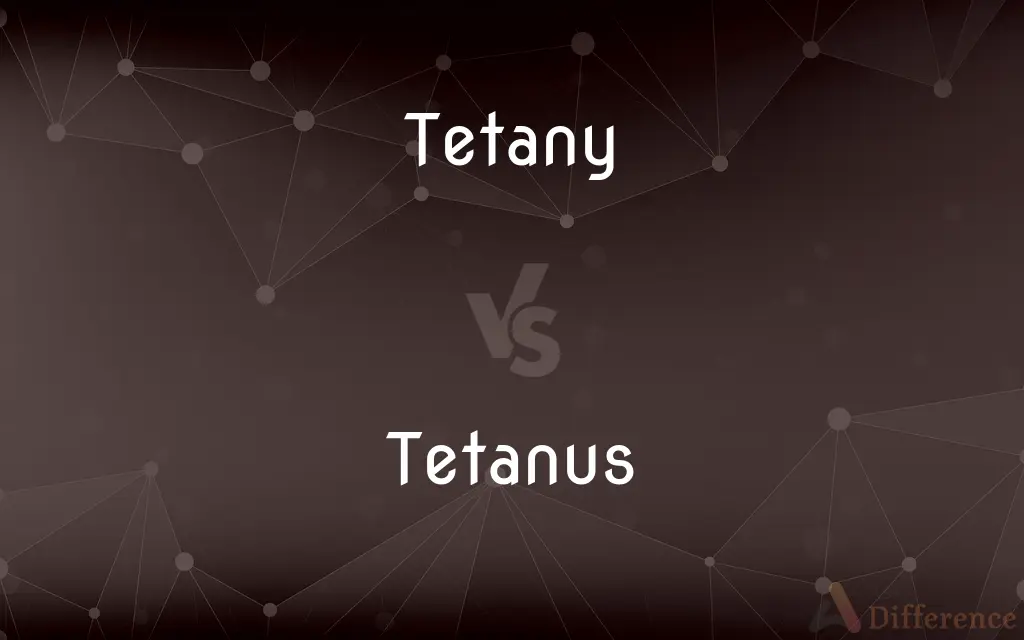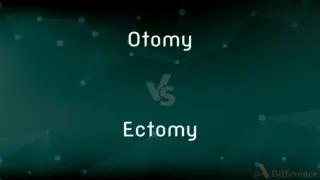Tetany vs. Tetanus — What's the Difference?
Edited by Tayyaba Rehman — By Fiza Rafique — Updated on September 21, 2023
Tetany is a medical condition characterized by involuntary muscle spasms often due to low calcium levels. Tetanus is a bacterial infection causing severe muscle stiffness and spasms, usually from a wound contaminated by Clostridium tetani bacteria.

Difference Between Tetany and Tetanus
Table of Contents
ADVERTISEMENT
Key Differences
Tetany is a medical syndrome characterized by tingling, numbness, and muscle spasms, commonly due to low levels of calcium in the blood. It may occur in various situations such as hyperventilation, malnutrition, or vitamin D deficiency. On the other hand, tetanus is an infection caused by the bacteria Clostridium tetani, which is often contracted through puncture wounds or other injuries that become contaminated.
The primary symptoms of tetany often include muscle cramps, spasms, and twitching in extremities like the hands and feet. It's more about biochemical imbalances in the body. Tetanus, however, results in severe muscle stiffness, starting from the jaw and progressing downwards. The stiffness may become so severe that it leads to lockjaw and other complications.
While tetany is typically treated with calcium supplementation and treatment of the underlying cause, the management of tetanus requires more aggressive interventions like tetanus immunoglobulin, antibiotics, and sometimes surgical removal of the infected tissue. Tetanus is preventable through vaccination, whereas there's no vaccine for tetany.
Tetany does not necessarily result from bacterial contamination and is generally not life-threatening if managed promptly. Tetanus, however, is often a medical emergency that requires immediate attention, as it can lead to respiratory failure and death if left untreated.
Comparison Chart
Cause
Low calcium levels, hyperventilation
Bacterial infection (Clostridium tetani)
ADVERTISEMENT
Symptoms
Muscle cramps, tingling, spasms
Muscle stiffness, lockjaw, spasms
Treatment
Calcium supplements, address underlying cause
Tetanus immunoglobulin, antibiotics, surgery
Prevention
Address underlying conditions
Tetanus vaccine
Severity
Generally not life-threatening
Can be life-threatening
Compare with Definitions
Tetany
A symptom of low calcium levels.
Tetany can occur when blood calcium levels drop too low.
Tetanus
Preventable by vaccination.
A tetanus vaccine can prevent the condition.
Tetany
A condition causing involuntary muscle spasms.
The patient was diagnosed with tetany due to hypocalcemia.
Tetanus
A bacterial infection causing muscle stiffness.
Stepping on a rusty nail put him at risk for tetanus.
Tetany
Characterized by tingling and numbness.
The patient felt tingling in the hands, a common sign of tetany.
Tetanus
Caused by Clostridium tetani bacteria.
The wound was infected with Clostridium tetani, leading to tetanus.
Tetany
Often related to hyperventilation.
The hyperventilation led to acute tetany.
Tetanus
Known for causing lockjaw.
The tetanus infection led to lockjaw.
Tetany
Generally treatable with calcium supplements.
Calcium supplements can usually alleviate the symptoms of tetany.
Tetanus
Tetanus, also known as lockjaw, is a bacterial infection characterized by muscle spasms. In the most common type, the spasms begin in the jaw and then progress to the rest of the body.
Tetany
Tetany or tetanic seizure is a medical sign consisting of the involuntary contraction of muscles, which may be caused by disorders that increase the action potential frequency of muscle cells or the nerves that innervate them. Muscle cramps caused by the disease tetanus are not classified as tetany; rather, they are due to a lack of inhibition to the neurons that supply muscles.
Tetanus
A bacterial disease marked by rigidity and spasms of the voluntary muscles.
Tetany
A condition marked by intermittent muscular spasms, caused by malfunction of the parathyroid glands and a consequent deficiency of calcium.
Tetanus
The prolonged contraction of a muscle caused by rapidly repeated stimuli.
Tetany
An abnormal condition characterized by periodic painful muscular spasms and tremors, caused by faulty calcium metabolism and associated with diminished function of the parathyroid glands.
Tetanus
An acute, often fatal disease characterized by spasmodic contraction of voluntary muscles, especially those of the neck and jaw, and caused by the toxin of the bacterium Clostridium tetani, which typically infects the body through a deep wound. Also called lockjaw.
Tetany
(medicine) A condition characterized by painful muscular spasms, caused by faulty calcium metabolism
Tetanus
(Physiology) A state of continuous muscular contraction, especially when induced artificially by rapidly repeated stimuli.
Tetany
A morbid condition resembling tetanus, but distinguished from it by being less severe and having intermittent spasms.
Tetanus
A serious and often fatal disease caused by the infection of an open wound with the anaerobic bacterium Clostridium tetani, found in soil and the intestines and faeces of animals.
Tetany
Clinical neurological syndrome characterized by muscular twitching and cramps and (when severe) seizures; associated with calcium deficiency (hypoparathyroidism) or vitamin D deficiency or alkalosis
Tetanus
A state of muscle tension caused by sustained contraction arising from a rapid series of nerve impulses which do not allow the muscle to relax.
Tetanus
A painful and usually fatal disease, resulting generally from a wound, and having as its principal symptom persistent spasm of the voluntary muscles. When the muscles of the lower jaw are affected, it is called locked-jaw, or lickjaw, and it takes various names from the various incurvations of the body resulting from the spasm.
Tetanus
That condition of a muscle in which it is in a state of continued vibratory contraction, as when stimulated by a series of induction shocks.
Tetanus
An acute and serious infection of the central nervous system caused by bacterial infection of open wounds; spasms of the jaw and laryngeal muscles may occur during the late stages
Tetanus
A sustained muscular contraction resulting from a rapid series of nerve impulses
Tetanus
Can lead to severe complications.
Untreated tetanus can result in respiratory failure.
Common Curiosities
What is tetanus?
Tetanus is a bacterial infection causing muscle stiffness and spasms.
Is tetanus preventable?
Yes, tetanus is preventable through vaccination.
How is tetany treated?
Treatment usually involves calcium supplementation and addressing the underlying cause.
What are common triggers for tetany?
Low calcium levels and hyperventilation are common triggers.
Is tetany life-threatening?
Generally, tetany is not life-threatening if treated promptly.
How is tetanus diagnosed?
Tetanus is usually diagnosed based on symptoms and medical history.
What is tetany?
Tetany is a medical condition causing muscle cramps and spasms, often due to low calcium levels.
What are the symptoms of tetany?
Symptoms include muscle spasms, tingling, and cramps.
Can tetanus be fatal?
Yes, untreated tetanus can be life-threatening.
What is the tetanus vaccine?
The tetanus vaccine is an immunization that protects against the tetanus bacteria.
What causes tetanus?
Tetanus is caused by Clostridium tetani bacteria, often entering the body through a wound.
How quickly does tetanus develop?
Tetanus symptoms can appear within 3 to 21 days after infection.
Is there a cure for tetanus?
There's no cure, but treatment can manage symptoms and complications.
Can tetany be chronic?
Tetany is usually acute but can recur if underlying conditions aren't managed.
Are there any tests for tetany?
Blood tests for calcium levels can help diagnose tetany.
Share Your Discovery

Previous Comparison
Otomy vs. Ectomy
Next Comparison
Ecologic vs. EcologicalAuthor Spotlight
Written by
Fiza RafiqueFiza Rafique is a skilled content writer at AskDifference.com, where she meticulously refines and enhances written pieces. Drawing from her vast editorial expertise, Fiza ensures clarity, accuracy, and precision in every article. Passionate about language, she continually seeks to elevate the quality of content for readers worldwide.
Edited by
Tayyaba RehmanTayyaba Rehman is a distinguished writer, currently serving as a primary contributor to askdifference.com. As a researcher in semantics and etymology, Tayyaba's passion for the complexity of languages and their distinctions has found a perfect home on the platform. Tayyaba delves into the intricacies of language, distinguishing between commonly confused words and phrases, thereby providing clarity for readers worldwide.













































